







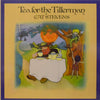
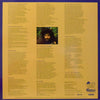


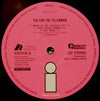
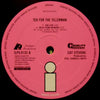
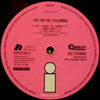

Cat Stevens – Tea For The Tillerman (2LP, 45 tours, 200g)
ORDER LIMITED TO ONE ITEM PER CUSTOMER
Guitar, Keyboards, lead vocals – Cat Stevens [click here to see more vinyl featuring Cat Stevens]
Guitar [Second], backing vocals – Alun Davies
Double bass – John Ryan
Drums, congas, tambourine – Harvey Burns
Solo violin - John Rostein
Strings arranged by Del Newman
Written by Cat Stevens
2 LP, gatefold jacket by Stoughton Printing Co.
Limited to 3,500 numbered copies
Original analog Master tape : YES
Heavy Press : 200g
Record color : black
Speed : 45RPM
Size : 12”
Stereo
Studio
Record Press : Quality Record Pressings
Label : Analogue Productions
Original Label : ABC
Recorded May–July 1970 at Morgan Studio (London), Island Studio (London), Olympic Studio (London)
Produced by Paul Samwell-Smith
Mastered and lacquer cut by George Marino at Sterling Sound
Reissue supervised by Bill Levenson
Design by Junie Osaki
Front Illustration by Cat Stevens
Photography by Shep
Originally released in November 1970
Reissued in April 2015
Tracks :
Side A:
-
Where Do the Children Play?
-
Hard Headed Woman
-
Wild World
Side B:
-
Sad Lisa
-
Miles From Nowhere
Side C:
-
But I Might Die Tonight
-
Longer Boats
-
Into White
Side D:
-
On The Road To Find Out
-
Father And Son
-
Tea For The Tillerman
Awards:
Rolling Stone 500 Greatest Albums of All Time - Ranked 205/500
TAS Super LP List! Special Merit: Informal
Reviews :
"The answer is simple: it remains a great, enduring piece of folk/rock, brilliantly performed and recorded...What makes this music special and capable of enduring through the decades? For one thing, the songs have memorable melodies, even the ones built upon two chord vamps like the opener, 'Where Do the Children Play' a prescient, still relevant song about the environment, overdevelopment and whatever else you wish to read into it. The production and sound remain spectacular and the arrangements, combining strummed acoustic guitars, strings arranged by Del Newman, stand up bass and drums sets the perfect stage for Stevens' simultaneously tender and gruff vocalizing." Analogplanet
"These (two new LPs from Reference Recordings) and Analog Production's remastering of Tea for the Tillerman were both pressed at Quality Record Pressings, the superb Salina, Kansas, facility, and they are the best and the quietest LPs I've heard of recordings made during the LP era. In a sense, the silences of QRP's pressings, their lack of those hard-to-define anomalies of stylus-in-groove sonics, are comparable to the kind of quietness inherent in a magnetic-drive turntable...QRP has put its best feet forward. 'Spectacular' in this case means a freedom from defects (snaps, crackles, and pops) and an absence of groove noise and what I would call vinyl 'rumble,' hard to define except by contrast with normal pressings." - Harry Pearson, The Absolute Sound, January 2012
“Mona Bone Jakon only began Cat Stevens' comeback. Seven months later, he returned with Tea for the Tillerman, an album in the same chamber-group style, employing the same musicians and producer, but with a far more confident tone. Mona Bone Jakon had been full of references to death, but Tea for the Tillerman was not about dying; it was about living in the modern world while rejecting it in favor of spiritual fulfillment. It began with a statement of purpose, "Where Do the Children Play?," in which Stevens questioned the value of technology and progress. "Wild World" found the singer being dumped by a girl, but making the novel suggestion that she should stay with him because she was incapable of handling things without him. "Sad Lisa" might have been about the same girl after she tried and failed to make her way; now, she seemed depressed to the point of psychosis. The rest of the album veered between two themes: the conflict between the young and the old, and religion as an answer to life's questions. Tea for the Tillerman was the story of a young man's search for spiritual meaning in a soulless class society he found abhorrent. He hadn't yet reached his destination, but he was confident he was going in the right direction, traveling at his own, unhurried pace. The album's rejection of contemporary life and its yearning for something more struck a chord with listeners in an era in which traditional verities had been shaken. It didn't hurt, of course, that Stevens had lost none of his ability to craft a catchy pop melody; the album may have been full of angst, but it wasn't hard to sing along to. As a result, Tea for the Tillerman became a big seller and, for the second time in four years, its creator became a pop star.” AllMusic Review by William Ruhlmann
Rating:
AllMusic : 5 / 5 , Discogs 4.59 / 5 , Analogplanet : Music 10/11, Sound 10/11

